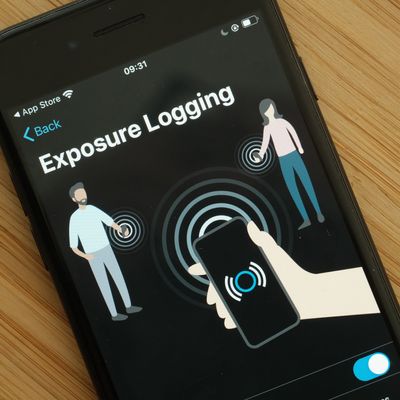
In late May, Apple and Google launched a program through which the companies provided technology to states so that they could build apps to allow COVID-19 contact tracing through residents’ phones. The announcement was met with acclaim: Contact tracing — the practice of asking patients who they’ve been in touch with in order to determine the virus’s spread — is an important tool in understanding and stopping the continued growth of the coronavirus. With the two tech giants pitching in, the process, in theory, could be made all the more accessible.
But the process has stalled. Skeptical of data breaches and corporate access to personal health information, Americans do not appear willing to use the technology in large enough numbers for it work. While tracing apps need an estimated 60 percent of the population participating to be effective, one study found that just 29 percent of Americans would consider using one. On the latest episode of the Pivot podcast, Kara Swisher and Scott Galloway discuss why tech-driven contact-tracing is unlikely to thrive in America.
Scott Galloway: These apps aren’t getting any take-up. Due to the decentralization of the data, only three states have decided to pursue a project related to the Google/Apple tech. What do you think here, Kara?
Kara Swisher: As Americans, we’re exceptional at not cooperating. I think it’s a good idea in concept, especially if privacy is protected, but in general I think technology is not necessarily the solution here, except when it comes to crunching the numbers later.
As Trump is scaling down federal funding of testing and contact tracing, I just don’t think the tech giants help that much. I do think states are going to have to do this themselves because the federal government has abrogated its role completely. What do you think?
Subscribe on:
Galloway: Tracing is still one of those things that can’t be outsourced to technology. The technology can be a tool, but at the end of the day it’s got to be an innovative, high-EQ person that has the presence to reach out to someone and say, “Hi, we’re here to help.” Someone who’s going to sit down and really ask the right questions to try and understand who a patient has been in contact with. Pre-pandemic, we had 2,500 tracers in the United States, mostly focused on foodborne illnesses and STIs. Now there’s an opportunity, and we’ve talked about this before, to take all these out-of-work kids — maybe 500,000 of the 11 million students who aren’t going to be returning to college campuses in September 1 — and turn them into a corona corps of tracers.
Our response to the virus is the worst in the world at this point, and our weakest link right now is tracing. To assume that tracing is a problem with all the data already provided, then getting Google involved would be great — a .0005-second search through all the information would solve it.
But it’s a problem of feet on the street: We need an army of actual human tracers.
There are some really hopeful bills that have received bipartisan sponsorship around social service or public service that potentially could evolve something like a corps of tracers. But the bottom line is: If we had more competent, more creative governments, if we hadn’t totally gutted the coffers of our local health administrations, we would be in a position to rally hundreds of thousands of young people who aren’t immune, but are less damaged by this virus, to begin the mother of all tracing, using handheld technologies. But you’ve got to have the hands to hold these technologies, and that’s what we’re missing.
Swisher: But for the tracers on the ground, you could see people with iPads, things like that, instead of paper. That’s how technology could be put to use.
Galloway: You know what a lot of it is? Empathy. You find out someone’s been exposed, and they have to leave their house because their kids don’t have childcare and could potentially infect other people. No amount of processing power —I don’t care if it’s a singularity or AI — can match the nuance of a person asking, “How can we help so that you don’t go out and infect dozens of other people?” So it’s not only tracing, it’s really about suppressing the R value.
This is an enormous chance for us to rally some of the millions of people who are all of a sudden out of work, and give them a sense of pride and agency in something greater than themselves — to stand shoulder to shoulder with other young people, and serve America. I think it’s a huge opportunity.
Pivot is produced by Rebecca Sananes. Erica Anderson is the executive producer.
This transcript has been edited for length and clarity.





























